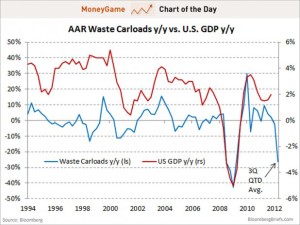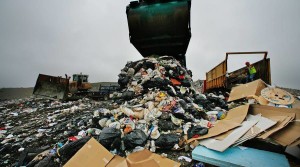Garbage is an unlikely economic indicator that actually has an 82% correlation to US economic growth, according to economists Michael McDonough and Carl Riccadonna. It is very intuitive because in times of economic well being, consumers buy more and as a result throw more away. If you buy a new TV you will throw out an old one, or if you go out to dinner you will throw away food you have at home and leftovers from your meal out. The more excess money people have, the more they buy, and are more careless about what they throw away.
Waste comes in many different forms. Michael McDonough states, “That’s what’s great about this indicator. It’s holistic because it’s not isolated to a single part of the economy. It’s people throwing things out, it’s buildings being demolished — it’s everything.” Almost half of the trash indicator is steel and iron waste, and the next biggest component is demolition and municipal waste.
In good economic times there is also an increase in waste from commercial and residential construction. With a lot of construction, there is also a lot of material added to waste. The data comes from the American Association of Railroads on a weekly basis, which means that it is very up to date. Garbage is therefore not a leading indicator, but can likely be classified as a coincident indicator or a slightly lagging indicator. In order to collect the data people must have already bought things and thrown them away.
The holidays are a time when we can especially see the correlation between garbage and the economy. In times of economic well-being, people will buy a lot- gifts, food, decorations, etc. This all turns into trash after the holidays and the trash bins will be overflowing. In a time of recession, people are much more conservative about what they are purchasing, especially around the holidays. Fewer gifts, less extravagance, and therefore less trash.
Garbage may seem very commonplace, yet it is a very relevant indicator that shouldn’t be overlooked. In the chart below we can see the very close correlation between GDP and AAR Waste Carloads from 1994 to 2012.

Sources:
http://www.recyclereminders.com/blog/trash-economic-prosperity/
http://www.marketplace.org/2012/08/16/economy/tracking-economy-and-gdp-through-trash
http://www.businessinsider.com/chart-of-the-day-the-us-garbage-indicator-economy-2012-7

Leave a Reply
You must be logged in to post a comment.